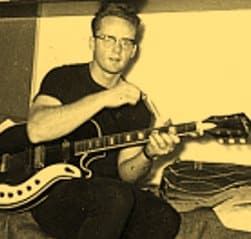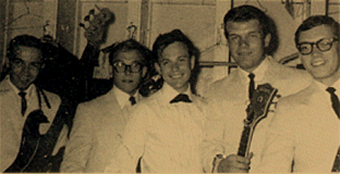 He started up a series of garage bands that began making minor waves on the local scene, starting with The Rave Ons (dubbed in honour of the Buddy Holly song), and Allan And The Silvertones (after the brand of a new guitar he’d bought) in the late 1950’s. Incarnations of The Silvertones had pretty much everyone on the block involved at one time or another. But it was the final version of The Silvertones that featured Randy Bachman and Garry Peterson formerly of The Velvetones, Jim Kale and Bob Ashley that started making waves. They were discovered by Herb Britton, a local radio station music director. He took them to Minneapolis, where they recorded “Tribute to Buddy Holly,” backed with a kind of a Floyd Cramer piano instrumental called “Back and Forth.” in 1962. They were signed to American-Canadian Records later that year, and because it was back when radio DJ’s could play pretty much what they wanted as often as they wanted, the single did reasonably well in the midwest on both sides of the border. “I Just Didn’t Have The Heart,” backed by “Back And Forth” came shortly after the New Year. The exposure even got them a gig opening up for Bobby Curtola on a number of dates. Shortly after the release of that second single, he started going by the name of Chad Allan (taken from the lead of the folk group The Chad Mitchell Trio), and the group’s name was changed to The Reflections when they were signed to Quality Records that spring. They released the two singles “Shy Guy,” with “Baby’s Got A Brand New Beau” as the b-side, then “Stop Teasing Me,” backed by “A Shot of Rhythm ‘N’ Blues” that year. But to avoid confusion with a Motown group of the same name, the band went through yet another name change to The Expressions. Up to this point it was Allan himself was handling the actual management and booking for the group, but that changed when they were introduced to Bob Burns, the host of a Saturday afternoon dance program on CJAY TV, who agreed to become the band’s manager. This was all still before the implementation of Candian content regulations, and the band was having a tough time getting radio stations outside the midwest to take notice, The song became the title track to the group’s first album later that year, which also featured the single’s flip side, “Til We Kissed,” a cover of Bobby Darin’s “Tossin’ and Turnin’,” which reached #3 in Canada, and several of the band’s singles to that point. Under the urging from the label, the record was credited as Guess Who? – Chad Allan & The Expressions. That fall, on invitation from Paul Cantor of Scepter Records, the band traveled to New York and worked with the company’s staff writers. The end product was HEY HO (WHAT YOU DO TO ME), also released under the confusing band name, which featured 11 tracks, some originals, some leftovers, some covers and a few collaberations with the Scepter writing staff. The title track failed to make a dent Stateside, but reached #3 in Canada. “Hurting Each Other” was also released as a single, and cracked the Canadian Top 20, but failed to chart in the States. The same song would become a major hit for The Carpenters several years later. Ashley left the group before 1965 was over, and was replaced by Burton Cummings, formerly of The Deverons the following January. Within weeks the band was back in the studios. But disenchanted with where the band was headed, and after one more single (“And She’s Mine”), Allan left that May to pursue outside interests, which included going back to school and getting BAs in psychology and music. The album came out shortly after he’d left, as the first Guess Who album, even though he did perform on it and wrote one of the tracks. In 1967 Allan took over the job of hosting the Winnipeg portion of the CBC’s “Music Hop” program, which was later redubbed “Let’s Go.” The show featured Allan and his backing group The Good Time Music Appreciation Society, along with various local talent. The house band usually featured, ironically enough, The Guess Who. After the cancellation of the show in ’68, Allan formed the Chad Allan Trio and returned to where it all began, doing the local area circuit while filling the airwaves with a folk/rock blend. He formed his own record label, Seabreeze Records and in 1970 he released his first solo album, LOOKING THROUGH THE CRYSTAL GLASS, which featured the title track as the first single,” backed with, “I’ll Think Of You Sometimes.” Other tracks included “Ramona’s Hourglass” and “One Back Step,” which was produced by Bachman. In 1971, Bachman came calling again, looking for a singer for his new outfit called Brave Belt. The group released two albums for Reprise Records, but Allan found himself again in a group not headed the direction he was musically, and left in ’72. He released SEQUEL, his solo follow-up later that year. For the most part it followed suit of its predecessor. The album featured 10 original tracks he’d co-written with friends, including a remaked of “Dunrobin’s Gone” (named after a street in Winnipeg), a reminiscent look back at his roots which he’d recorded only a year or so earlier with Brave Belt. He again fell back on outside interests to keep himself busy, including writing gospel music, and hosting a local children’s TV program back home in Winnipeg. In ’74 he got involved with an operatic productio of “Beowulf,” based on the old Anglo Saxon legend, and with himself playing the lead part. Initiated by composer, arranger, and conductor Victor Davies, the album also featured Betty Jean Wylie on the lyrics libretto. Originally intended to be a three album set, it was whittled down to a double record and released in ’74, which was re-released in 1983.
|

 until Quality’s George Struth came up with the marketing idea of issuing “Shakin’ All Over” as a single in ’65. The original radio promo label had only a white background and the words ‘Guess Who?’ written in black on it. Radio stations had contests where listeners would guess the artist, and along with a ‘name that band’ contest, the name stuck as a sort of ‘nick name,’ and the record went on to sell over a million copies, became the first Canadian #1 in the US, and the band became staples on the circuit through the midwest at home and into the US.
until Quality’s George Struth came up with the marketing idea of issuing “Shakin’ All Over” as a single in ’65. The original radio promo label had only a white background and the words ‘Guess Who?’ written in black on it. Radio stations had contests where listeners would guess the artist, and along with a ‘name that band’ contest, the name stuck as a sort of ‘nick name,’ and the record went on to sell over a million copies, became the first Canadian #1 in the US, and the band became staples on the circuit through the midwest at home and into the US. The record was an easy laid-back AM pop formatted record that also contained a remake of his biggest hit, “Shakin’ All Over.”
The record was an easy laid-back AM pop formatted record that also contained a remake of his biggest hit, “Shakin’ All Over.”




